
Publish time: Wed Aug 05 00:00:00 CST 2015
On July 9, 2015, the 2015 Cologne Annual Summit On Commercial Dispute Resolution In China was successfully hosted at the Hilton Cologne by the Beijing Arbitration Commission, also known as the Beijing International Arbitration Center (the “BAC”), jointly with the China European Arbitration Center (the “CEAC”).
This is for the third time the Summit is held in succession to its first launching in 2013, and is the second stop of the roadshow in Europe this year. Based on the Commercial Dispute Resolution in China: An Annual Review and Preview (2015) (the “Annual Report”), the Summit has attracted a number of professionals from Germany and other neighboring countries. Participants including top scholars from renowned colleges, senior partners from top law firms of various states have conducted a comprehensive and in-depth discussion on different industries of Chinese commercial dispute resolution. The Summit covered eight parts in total, respectively on arbitration and mediation, dispute resolution in energy, construction, international trade, financial, real estate, investment and IP industries. Just as commented by the CEAC President Mr. Thomas Weimann in his closing speech, this summit promoted the understanding of each other’s dispute resolution between Chinese and German arbitration communities, and started a new chapter in China-Germany communications on legal practice.
The Summit is sponsored by CMS Hasche Sigle, and is supported by LexPR, with media support from LexisNexis, Wolters Kluwer, Business Law, China’s Law, Inter-Pacific Bar Association Journal, Asian Dispute Review, Global Arbitration Review, Legal Daily, People's Court Daily, China Economic Weekly, Legal Person, and famous Chinese and foreign websites like China Go Aboard.
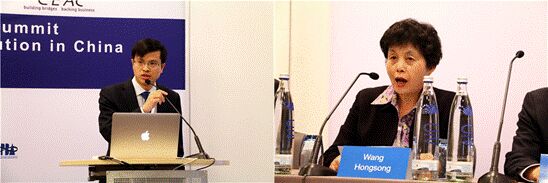
|
|
|
Dr. Chen Fuyong
|
Madame Wang Hongsong
|

|
|
|
Dr. Christine Heeg
|
The Summit
|
The opening ceremony was hosted by Dr. Chen Fuyong, Deputy Secretary General of the BAC. The Vice Chairperson of the BAC Madame Wang Hongsong delivered an opening address. She firstly extended warm thanks to the sponsors, supporters, media supporters and participants, and then made an introduction of the industries covered by the Annual Report. Madame Wang pointed out that the BAC would continue to organize the Annual Report and the Summit, with a sincere wish to promote the communication between Chinese and foreign arbitral communities and to push the wills and decisions of Chinese and foreign exchange on commercial dispute resolution. Dr. Christine Heeg, Secretary General of the CEAC, subsequently gave her opening speech. She expressed high recognition of the Annual Report, and also gave applause to the BAC for its consistent endeavors in promoting the international communication on Chinese commercial dispute resolution. Thereafter, the Summit convened in accordance with the content of the Annual Report on eight sub-topics in turn, including Arbitration and Mediation, Dispute Resolution in Energy, Construction, International Trade, Financial, Real Estate, Investment and Intellectual Property industries.
Session on “Recent Development in Chinese Arbitration and Mediation”
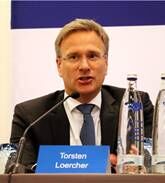
|
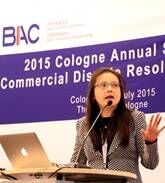
|
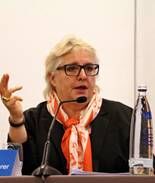
|
|
Dr. Torsten Loercher
|
Dr. Helena Chen
|
Dr. Sabine Stricker-Kellerer
|
Mr. Torsten Loercher, a partner of CMS Hasche Sigle, moderated the session on “Recent Development in Chinese Arbitration and Mediation”. Dr. Helena Chen, a partner of Pinsent Masons LLP and a BAC arbitrator, made a general introduction of the arbitration development in China during the past 20 years according to statistics based on the Annual Review on Commercial Arbitration in China (2015). In particular, she stressed that the year of 2014 was undoubtedly the remarkable year with the most booming growth of Chinese arbitration among the past two decades, not only in the caseload, but also in its essence. Dr. Chen then took the BAC as an example and highlighted the BAC’s impressive achievements in its arbitration and mediation services respectively with detailed statistics. Meanwhile, she presented an analysis of the status quo of judicial supervision of Chinese arbitration and arbitral awards by referring to typical cases. This speech was followed by comments by Dr. Sabine Stricker-Kellerer, a senior China counsel of Freshfileds Bruckhaus Deringer, who gave a positive evaluation of the gradual improvement of Chinese commercial arbitration’s environment as well as the breakthrough of Chinese commercial mediation system. In addition, she analyzed the similarity and difference between Chinese and German dispute resolutions. The similarity lies in the long time spent for communication with clients, and the difference is the high proportion and priority of mediation in Chinese dispute resolution. Thereafter, Dr. Stricker-Kellerer had a lively discussion with Dr. Chen and other participants over the recognition and enforcement of foreign arbitral awards in mainland China.
Session on “Recent Developments in Dispute Resolution in Chinese Energy Law”
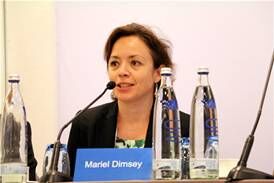
|
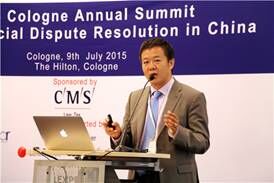
|
|
Ms. Mariel Dimsey
|
Mr. Zhang Libin
|
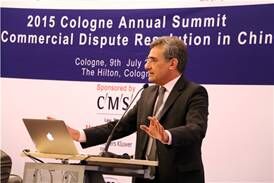
|
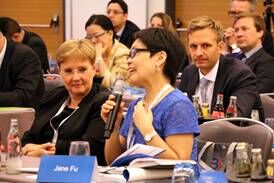
|
|
Mr. Christian Borris
|
Q&A
|
The session on “Recent Developments in Dispute Resolution in Chinese Energy Law” was moderated by Ms. Mariel Dimsey, a partner of Cleary Gottlieb Steen & Hamilton. Mr. Zhang Libin, a partner of Broad & Bright and a BAC arbitrator, made a presentation on dispute resolution status quo in Chinese oil and gas, coal mining and power (including renewable energy) industries with reference to representative cases based on the Annual Review on Energy Dispute Resolution (2015). He pointed out that the violent growth of arbitration in 2014 also reflected certain problems with Chinese energy industry like environmental pollution and industrial monopoly, which should be noteworthy to the whole society. Nowadays, Chinese legislation and policy on energy-related arbitration are still in a transitional period, and therefore should be market-oriented and conducted on the ground of existing rules. Mr. Christian Borris, a partner of Borris Hennecke Kneisel then gave his remarks. He believed that energy strategy was not only a problem for China, but also a problem for the whole world, and introduced the energy reform and energy dispute resolution of Germany and Europe during the last 15 to 20 years. He hoped that the studies and adoption of those advanced dispute resolution mechanisms would help to solve the problem.
Session on “Recent Developments in Dispute Resolution in Chinese International Trade Law”
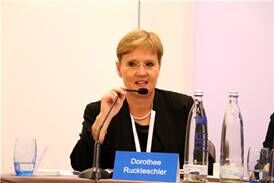
|
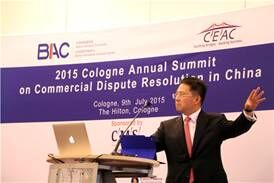
|
|
Dr. Dorothee Ruckteschler
|
Dr. Wang Xuehua
|
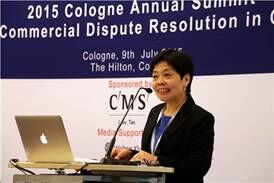
|
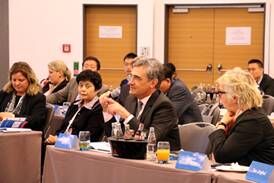
|
|
Ms. Jane Fu
|
Q&A
|
Dr. Dorothee Ruckteschler, a partner of CMS Hasche Sigle, moderated the session on “Recent Developments in Dispute Resolution in Chinese International Trade Law”. Dr. Wang Xuehua, the leading author of the Annual Review on International Trade Dispute Resolution (2015), a partner of Huanzhong & Partners, Beijing, introduced the new laws and regulations as well as sample cases of 2014, and highlighted the up-to-date theoretical achievements on international trade dispute resolution. Following his speech, Ms. Jane Fu, a senior lecturer of Deakin University and a BAC arbitrator provided remarks. Taking the Free Trade Agreement between China and Australia as a sample, she introduced the practical problems of Chinese enterprises when exporting products to Australia and effective resolutions thereof, as well as the selection of Chinese arbitration institutions by foreign companies in the event of dispute within China.
Session on “Recent Developments in Dispute Resolution in Chinese Construction Law”
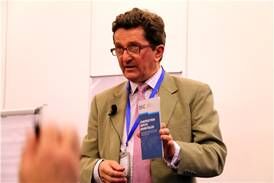
|
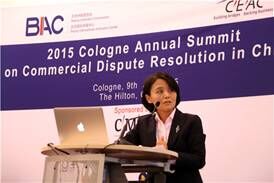
|
|
Mr. Andrew Burr
|
Mr. Tan Jinghui
|
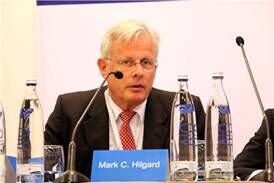
|
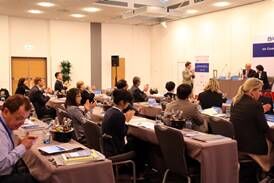
|
|
Dr. Mark C. Hilgard
|
The session
|
In the session on “Recent Developments in Dispute Resolution in Chinese Construction Law”, Mr. Andrew Burr, barrister of Atkin Chambers, Chief Editor of the Construction Law Journal and a BAC arbitrator, acted as the moderator.
Ms. Tan Jinghui, the author of Annual Review on Construction Dispute Resolution (2015), a partner of the City Development Law Firm, Beijing and a BAC arbitrator, started her presentation with a summary of Chinese economy and its construction law, especially those important revisions thereof. Combined with case studies, she provided an in-depth interpretation of the recent development of Chinese construction law based upon analyses from perspectives of the construction market, law and policy, and contract wording. Ms. Tan was of the opinion that China in the future would promote the integrated development of construction and other industries in various fields, and under the existing legislation, policy adjustments would take place relating to the allocation of risks in finance, business, environmental engineering and commerce. Against such a background, she believed that commercial disputes will become unprecedentedly complicated, which will represent more challenges to dispute resolution practitioners. The commentator Dr. Mark C. Hilgard, a partner of Mayer Brown, subsequently introduced to the participants those major “disasters” in German construction by showing sample cases, and gave a humorous account of the similar problems shared in Chinese and German constructions.
Session on “Recent Developments in Dispute Resolution in Chinese Financial Law”
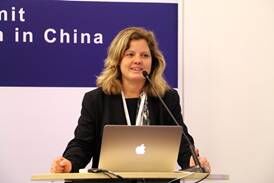
|
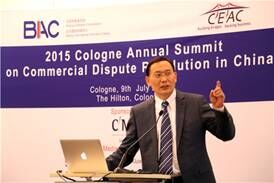
|
|
Dr. Christine Heeg
|
Dr. Tao Xiuming
|
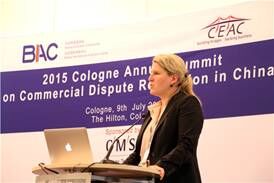
|
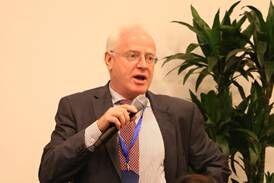
|
|
Dr. Andrea Leufgen
|
Q&A
|
The session on “Recent Developments in Dispute Resolution in Chinese Financial Law” convened under the hosting of Dr. Christine Heeg, Secretary General of CEAC. Dr. Tao Xiuming, the leading author of the Annual Review on Financial Dispute Resolution (2015), a partner of JunZeJun Law Offices and a BAC arbitrator, opened his speech with the question “why the caseload of Chinese financial disputes keeps going up”. In a mode of interaction and Q&A, he unveiled the status quo of the Chinese financial market and the measures to improve financial dispute resolution competence in China. Thereafter, Dr. Andrea Leufgen, a partner of Gleiss Lutz, as the commentator, expressed her strong interest in the Chinese financial dispute resolution market as presented by Dr. Tao, and shared the view with him concerning financial dispute resolution. She emphasized that the key issue was how to guide the clients to make a choice between litigation and arbitration, where China and Germany share similarities. Clients usually thought that disputes arising from the financial market would be of huge disputed amount and high complexity, and the selection of arbitration would lead to high costs. Dr. Andrea Leufgen therefore believed that proper guidance must be done by counsels and arbitration institutions, and for example, fast track dispute resolution mechanisms could help clients to settle their disputes more quickly, which would save the time costs and attorney’s fees.
Session on “Recent Developments in Dispute Resolution in Chinese Real Estate Law”
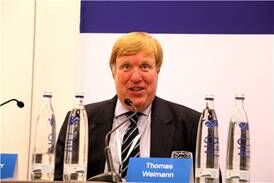
|
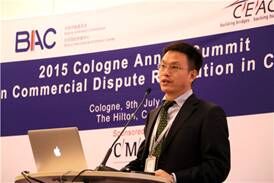
|
|
Mr. Thomas Weimann
|
Mr. Deng Yongquan
|
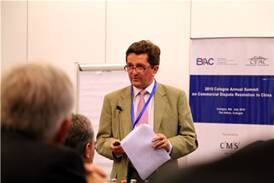
|
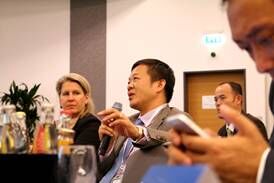
|
|
Mr. Andrew Burr
|
Q&A
|
Mr. Thomas Weimann, a partner of WEIMANN. Legal moderated the session on “Recent Developments in Dispute Resolution in Chinese Real Estate Law”. Mr. Deng Yongquan, the leading author of the Annual Review on Real Estate Dispute Resolution (2015), a partner of Dacheng Law Offices and a BAC arbitrator, introduced the status quo of the large number of cases resulted from the Chinese real estate market that has been sharply cooling down during 2014 in a brief and witty way. This indeed brought challenges to Chinese courts and arbitration institutions. Based on his personal experience, Mr. Deng concluded three essential factors for Chinese judges and arbitrators that could help them resolve such disputes more quickly and effectively. Mr. Andrew Burr appraised Mr. Deng’s thoughts and contributions to the real estate dispute resolution in China. He suggested the participants to have a clearer understanding of Chinese real estate disputes and the future development thereof according to the data shown in the report. Taking the British real estate market as a sample, Mr. Burr demonstrated that with the fast growth of the real estate industry, more disputes would arise, and then had a deep discussion with Mr. Deng as to the legal systems of China and UK.
Session on “Recent Developments in Dispute Resolution in Chinese Investment Law”
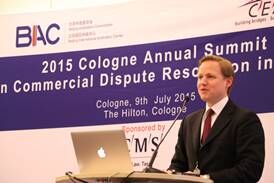
|
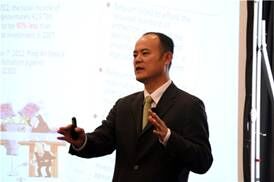
|
|
Dr. Philipp Hanfland
|
Mr. Chen Sheng
|
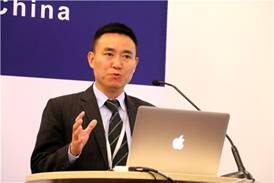
|
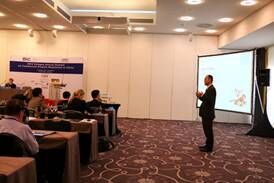
|
|
Prof. Chi Manjiao
|
The session
|
The session on “Recent Developments in Dispute Resolution in Chinese Investment Law” was hosted by Dr. Philipp Hanfland, a partner of Hengeler Mueller. Mr. Chen Sheng, a partner of King & Wood Mallesons, presented an analysis of the trend of Chinese investment development and its legal environment, clarified the newly emerged features of investment disputes under the background of a fast growth of Chinese economy, and made an interpretation thereof based on representative cases and relevant regulation terms. Based on his extensive studies and practical experience, the commentator Prof. Chi Manjiao, a senior researcher at GCR, provided the participants with an interpretation of the frequently seen problems in China-related cross-border investment due to culture gaps.
Session on “Recent Developments in Dispute Resolution in Chinese IP Law”
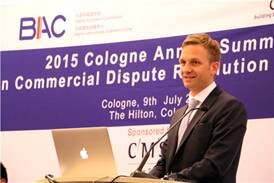
|
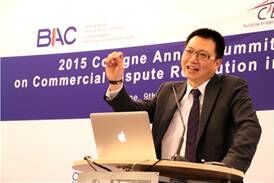
|
|
Dr. Volker Schumacher
|
Dr. Xie Guanbin
|
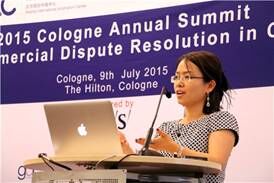
|
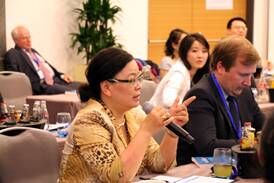
|
|
Dr. Zhang Chenguo
|
Q&A
|
Dr. Volker Schumacher, a partner of Prior & Partner, moderated the session on “Recent Developments in Dispute Resolution in Chinese IP Law”. Dr. Xie Guanbin, the leading author of the Annual Review on IP Dispute Resolution (2015), the founding partner of Lifang & Partners and a BAC arbitrator, started his speech with a brief introduction of the general situation of Chinese IP disputes and its increasing trend, and then noteworthy landmark IP cases and judicial jurisdictions thereof. Thereafter, Dr. Zhang Chenguo of University of Bremen provided an analysis Chinese courts’ judicial awards in IP cases, viewing that since the IP caseload has been going up sharply year by year, the courts’ decisions are not always satisfactory. In light of this situation, she also offered suggestions for the improvement thereof.
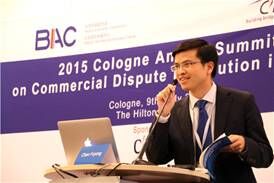
|
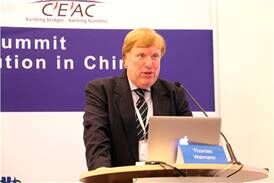
|
|
Dr. Chen Fuyong
|
Mr. Thomas Weimann
|
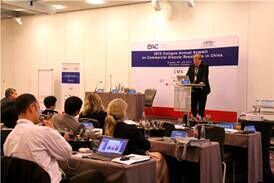
|
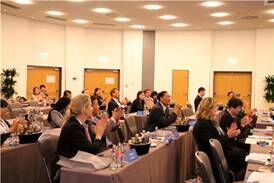
|
|
Closing ceremony
|
End of the Summit
|
The closing ceremony was also hosted by Dr. Chen Fuyong. The CEAC President Mr. Thomas Weimann delivered a closing address. He believed that this Summit promoted the understanding of each other’s dispute resolution between Chinese and German arbitration communities, and started a new chapter in China-Germany communications on legal practice. Meanwhile, the CEAC would continue to work with and support to the BAC for hosting such events in Europe.
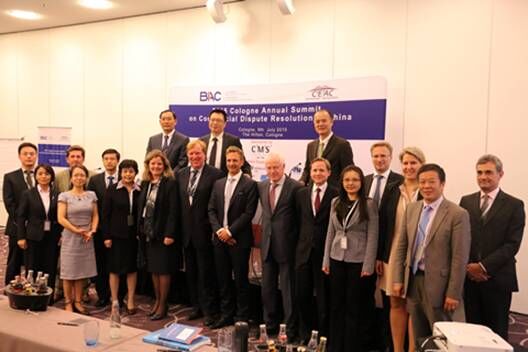
|
|
Part of speakers and participants
|
With a chorus of applause from all participants, the Summit successfully came to the end. Following the conference, the hosting institutions held a cocktail reception, where the participants and speakers had a further communication and exchanges.

|
|
|
Cocktail reception
|
|
The Summit unveiled the latest development of commercial dispute resolution in China to the international arbitration community, promoted the international communication within the industry, and strengthened the mutual trust and understanding between Chinese and foreign dispute resolution experts. In the future, the BAC will continue to organize the authoring of the Annual Reports and host such overseas events in various forms, so as to propel the globalization of Chinese arbitration, to promote the international communications and exchanges on commercial dispute resolution practice between China and other jurisdictions, and to contribute its efforts to the improvement of China’s capability of competition and cooperation in the global arbitration market.